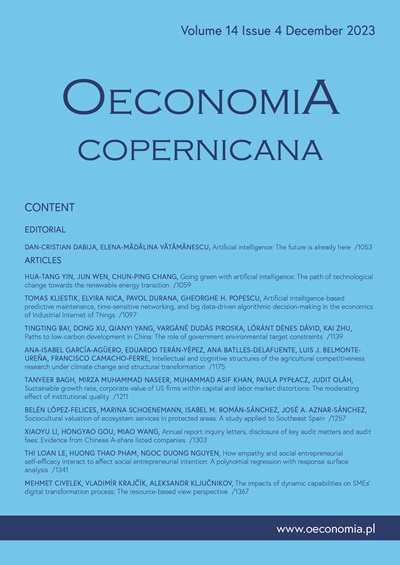基于人工物联网的金融科技大数据管理算法
IF 10.8
1区 经济学
Q1 ECONOMICS
引用次数: 3
摘要
研究背景:由于企业数字化,金融科技公司应该优化银行业在协助企业融资方面的绩效。基于人工物联网的金融科技数字化转型,可以相应扭转腐败关系链带来的信贷资源错配。本文的目的:我们旨在表明金融科技可以降低交易费用,巩固公司股票流动性,从而减少过度杠杆,减少资本市场的信息不对称和交易费用。基于人工智能和物联网的金融技术实现了与支付代币和虚拟钱包相关的沉浸式和协作式金融交易、购买和投资,管理金融数据、基础设施,以及跨共享交互式虚拟3D和模拟数字环境的价值交换。方法:AMSTAR是一种综合的关键测量工具,用于系统评价方法学质量评价,蒸馏器sr用于通过文献回顾阶段自动化产生准确和透明的循证研究,MMAT根据内容有效性和方法学质量预测因子评估和描述系统混合研究综述的研究清单。Rayyan是一个反应灵敏、直观的知识综合工具和基于云的文章纳入和排除建议架构,ROBIS评估与相关性和关注点相关的系统评价偏倚风险。作为报告质量评估工具,使用了由Shiny App生成的PRISMA检查表和流程图。作为大型数据集和网络的文献计量可视化和构建工具,Dimensions和VOSviewer发挥了重要作用。搜索词为“金融科技”+“人工智能”、“大数据管理算法”、“物联网”,搜索周期为2023年6月,已发表的研究检查为2023年,在188个来源中选择了35个来源。的发现,附加值:金融科技带来的金融产品数量的增长和金融行业经营绩效的优化,可以为企业快速提供多样化的融资选择。大数据驱动的金融科技创新对银行和资本市场至关重要,关系到金融机构的运营效率。通过数据驱动的技术和流程创新能力,基于AI系统的业务可以进一步自动化服务。本文章由计算机程序翻译,如有差异,请以英文原文为准。
Big data management algorithms in artificial Internet of Things-based fintech
Research background: Fintech companies should optimize banking sector performance in assisting enterprise financing as a result of firm digitalization. Artificial IoT-based fintech-based digital transformation can relevantly reverse credit resource misdistribution brought about by corrupt relationship chains. Purpose of the article: We aim to show that fintech can decrease transaction expenses and consolidates firm stock liquidity, enabling excess leverage decrease and cutting down information asymmetry and transaction expenses across capital markets. AI- and IoT-based fintechs enable immersive and collaborative financial transactions, purchases, and investments in relation to payment tokens and metaverse wallets, managing financial data, infrastructure, and value exchange across shared interactive virtual 3D and simulated digital environments. Methods: AMSTAR is a comprehensive critical measurement tool harnessed in systematic review methodological quality evaluation, DistillerSR is harnessed in producing accurate and transparent evidence-based research through literature review stage automation, MMAT appraises and describes study checklist across systematic mixed studies reviews in terms of content validity and methodological quality predictors, Rayyan is a responsive and intuitive knowledge synthesis tool and cloud-based architecture for article inclusion and exclusion suggestions, and ROBIS appraises systematic review bias risk in relation to relevance and concerns. As a reporting quality assessment tool, the PRISMA checklist and flow diagram, generated by a Shiny App, was used. As bibliometric visualization and construction tools for large datasets and networks, Dimensions and VOSviewer were leveraged. Search terms were “fintech” + “artificial intelligence”, “big data management algorithms”, and “Internet of Things”, search period was June 2023, published research inspected was 2023, and selected sources were 35 out of 188. Findings & value added: The growing volume of financial products and optimized operational performance of financial industries generated by fintech can provide firms with multifarious financing options quickly. Big data-driven fintech innovations are pivotal in banking and capital markets in relation to financial institution operational efficiency. Through data-driven technological and process innovation capabilities, AI system-based businesses can further automated services.
求助全文
通过发布文献求助,成功后即可免费获取论文全文。
去求助
来源期刊

Oeconomia Copernicana
ECONOMICS-
CiteScore
13.70
自引率
5.90%
发文量
26
审稿时长
24 weeks
期刊介绍:
The Oeconomia Copernicana is an academic quarterly journal aimed at academicians, economic policymakers, and students studying finance, accounting, management, and economics. It publishes academic articles on contemporary issues in economics, finance, banking, accounting, and management from various research perspectives. The journal's mission is to publish advanced theoretical and empirical research that contributes to the development of these disciplines and has practical relevance. The journal encourages the use of various research methods, including falsification of conventional understanding, theory building through inductive or qualitative research, first empirical testing of theories, meta-analysis with theoretical implications, constructive replication, and a combination of qualitative, quantitative, field, laboratory, and meta-analytic approaches. While the journal prioritizes comprehensive manuscripts that include methodological-based theoretical and empirical research with implications for policymaking, it also welcomes submissions focused solely on theory or methodology.
 求助内容:
求助内容: 应助结果提醒方式:
应助结果提醒方式:


